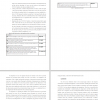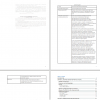Тема: The Influence of Entrepreneur's Subjective Perceptions on Entrepreneurial Exit Decision: A GEM Data Based Study
Закажите новую по вашим требованиям
Представленный материал является образцом учебного исследования, примером структуры и содержания учебного исследования по заявленной теме. Размещён исключительно в информационных и ознакомительных целях.
Workspay.ru оказывает информационные услуги по сбору, обработке и структурированию материалов в соответствии с требованиями заказчика.
Размещение материала не означает публикацию произведения впервые и не предполагает передачу исключительных авторских прав третьим лицам.
Материал не предназначен для дословной сдачи в образовательные организации и требует самостоятельной переработки с соблюдением законодательства Российской Федерации об авторском праве и принципов академической добросовестности.
Авторские права на исходные материалы принадлежат их законным правообладателям. В случае возникновения вопросов, связанных с размещённым материалом, просим направить обращение через форму обратной связи.
📋 Содержание
АННОТАЦИЯ 3
ABSTRACT 5
INTRODUCTION 8
CHAPTER 1. LITERATURE REVIEW AND PREVIOUS STUDIES 13
Definition of entrepreneur 13
Entrepreneur exit existing typologies 14
Theories 16
Social Cognitive Theory 16
Theory of Planned Behavior 19
Influence of entrepreneurial exit on the economy 21
Influence of the COVID-19 on the entrepreneurial exit 21
Hypotheses development 22
Perceived self-efficacy 23
Fear of failure 24
Perception of COVID-19 25
Moderation effect 26
Control variables 28
CHAPTER 2. RESEARCH DESING AND METHODOLOGY 32
Research strategy 32
Methodology 33
Data description 34
Running model 38
CHAPTER 3. RESULTS 43
Discussion of the results 43
Expected results 43
Unexpected results 44
Limitations 46
Further research 46
Theoretical contribution 47
Managerial implication 49
Conclusion 52
REFERENCES 54
📖 Введение
Despite the sufficient number of research on entrepreneurial exit, there exists a research gap concerning the role of personal perceptions factors in the decision-making process of exiting entrepreneurship. Previous studies have primarily concentrated on personal characteristics influencing an entrepreneur's exit decision, such as age, gender, education, experience, family, etc. There are following factors whose influence on exit from entrepreneurship has been extensively studied:
• Gender by Brannback, M., & Carsrud, A. L. (2016),
• age by De Clercq, D.,c& Soriano, D. R. (2014), Jack, S. L. & Schock, P. J. H. & Marlow, S. (2015), McCann, P., & Ortega-Argilds, R. (2015),
• the educational level by Fairlie, R. W., & Miranda, J. (2018), Franco, M., Lima, F., & Moreira, M. (2018), Kuckertz, A., & Berger, A. (2016), Schott, T., & van Praag, M. (2014),
• experience of the entrepreneur by DeTienne, D.R. & Cardon, M.S. (2012), Fairlie, R. W.,
& Miranda, J. (2018), Franco, M., Lima, F., & Moreira, M. (2018),
• business-family interface by Koladkiewicz, I. A., et all (2022), Bird, M., & Wennberg, K. (2016), Hsu, D. K., et all (2016), Chrisman, J. S., & Sharma, P. (2018), DeTienne, D.R. & Chirico, F. (2013),
• human capital by DeTienne, D. R., & Cardon, M. S. (2006), Block, J., & Sandner, P. (2018),
• motive and motivation of the entrepreneur by Obschonka, M., et all. (2019), Murnieks, C.
Y et all (2019), Van der Zwan, P., & Hessels, J. (2013), DeTienne, D.R. & Chandler, G.N.
(2010), Khavul, S., & Singh, P. R. (2015),
• business environment by Storey, D. J. &Scott, J. (2004),
• Industry of the entrepreneur’s firm by Cefis, E., & Marsili, O. (2011).
However, limited research has explored how entrepreneurs’ individual characteristics, like subjective perceptions influence on entrepreneur's decision to exit. Understanding the impact of subjective perceptions on the exit decision is crucial for developing effective support programs for entrepreneurs across different countries.
For instance, identifying specific personal perceptions associated with a higher likelihood of exiting entrepreneurship can inform the design of tailored support programs aimed at assisting entrepreneurs in developing or transforming these perceptions. Moreover, comprehending how personal perceptions influence exit decisions can assist policymakers in formulating strategies that foster entrepreneurship and support the exit process. This is particularly relevant in countries experiencing rapid economic growth, where initiating a new business is relatively straightforward, and supportive policies are needed to facilitate the closure of existing businesses and the creation of new ventures. Conversely, in countries where establishing a new business is challenging and entrepreneurs require assistance to survive in competitive environments, policies that promote non-exit options and sustain entrepreneurs become crucial. Therefore, investigating the role of individual perceptions in entrepreneurial exit decisions is vital for the development of comprehensive and context-specific entrepreneurship support programs.
Furthermore, conducting research on personal factors, such as individual perceptions, that influence business closures can provide entrepreneurs with valuable insights to make informed decisions regarding their own enterprises. By comprehending the intricate decision-making process and the underlying factors that shape it, entrepreneurs can assess their unique circumstances and strategically determine the course of their businesses, including the decision of whether and when to exit. This understanding can help entrepreneurs avoid common pitfalls and capitalize on opportunities, thereby enhancing their prospects for success.
For instance, if an entrepreneur is aware of having a higher fear of failure, they may exercise greater caution in their business decisions and meticulously assess the risks associated with closure. Similarly, if an entrepreneur recognizes that their perception of personal self-efficacy is relatively low, they can factor this characteristic into their decision-making during challenging times. Taking proactive measures, such as engaging in educational programs, pursuing professional development opportunities, and networking, can help boost their self-efficacy. Notably, DeTienne and Wennberg (2016) and Wennberg et al. (2011) have emphasized the significance of comprehending the factors that influence an entrepreneur's decision in selecting an exit strategy. By investigating these personal factors and their impact on exit decisions, entrepreneurs can make more informed choices, increasing their likelihood of success and minimizing potential setbacks. Understanding the dynamics of the decision-making process empowers entrepreneurs to navigate their entrepreneurial journeys with greater confidence and clarity.
...
✅ Заключение
The outcomes of the regression analysis were then compared and contrasted with the existing literature, enabling the formulation of recommendations for entrepreneurs, government officials, business support organizations, and researchers. By accomplishing these objectives, this research study successfully achieved its aim of assessing and interpreting the relationship between subjective perceptions of entrepreneurs (including perceived self-efficacy, perception of COVID- 19, and fear of failure) and the likelihood of exiting entrepreneurial activities during the COVID- 19 crisis with testing moderation effect. Thus, the goal of this research work was achieved: the relationship between the subjective perception of the entrepreneur (as perceived self-efficacy, perception of COVID-19 and fear of failure) and the probability of exiting entrepreneurial activities during COVID-19 bfla was assessed, interpreted and based on the conducted literature review and studied theoretical frameworks, recommendations were developed for various groups of stakeholders.
The findings emphasize the significance of subjective perceptions in shaping entrepreneurial exit decisions, particularly within the context of the COVID-19 pandemic. These insights can inform the development of targeted interventions, policies, and support programs aimed at facilitating informed decision-making and enhancing resilience among entrepreneurs.





